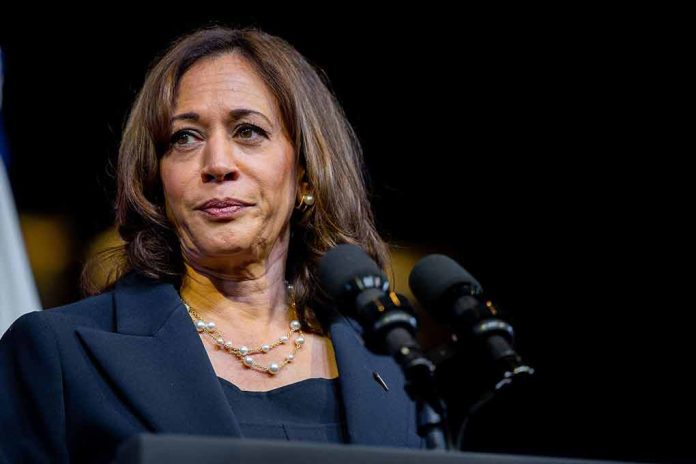
Kamala Harris faces mounting criticism for her uncertainty on the issue of reparations for African Americans, stirring a key debate on transparency and policy commitments.
At a Glance
- Vice President Kamala Harris has expressed support for reparations for Black people.
- Harris advocates for addressing historical and ongoing racial segregation and harm.
- Critics point to her reluctance to declare a definitive stance on specific reparations measures.
- The backlash underscores the need for clear policy declarations from political leaders.
Public Criticism and Political Pressure
Vice President Kamala Harris has recently faced significant criticism for her indecisiveness regarding reparations for African Americans. Despite her expressed support for reparations, Harris’s reluctance to outline a clear position on the measures has led to backlash from various quarters. Critics argue that her ambiguity raises questions about her commitment to addressing historical racial injustices and social equity.
This debate highlights the heightened public expectations for transparency from political leaders. Reparations remain a contentious and polarizing topic, with strong opinions on both sides. Harris emphasized the need for reparations to counter historical and ongoing racial harm, underscoring the importance of addressing undiagnosed and untreated trauma in the Black community.
KAMALA HARRIS NOT FOR REPARATIONS
US President Joe Biden appears to have heeded calls from fellow Democratic Party members to withdraw from the 2024 US presidential race, ending his re-election bid on 21 July.
This follows his debate performance on 27 June, which fuelled some… pic.twitter.com/eJCTd2Uxjk
— African Stream (@african_stream) July 22, 2024
Policy Proposals and Legislative Efforts
In her previous political roles, Harris has supported several policy proposals addressing racial inequity. She endorsed H.R. 40, a House proposal aiming to establish a commission to study reparations for African Americans. This bill, currently facing challenges, seeks to review the U.S. government’s role in supporting slavery and recommend remedial measures.
“I think there has to be some form of reparations and we could discuss what that is, but look, we’re looking at more than 200 years of slavery,” she said. “We’re looking at almost 100 years of Jim Crow. We’re looking at legalized segregation and in fact segregation on so many levels that exist today based on race and there has not been any kind of intervention done understanding the harm and the damage that occurred to correct [the] course. And so we are seeing the effects of all those years play out still today.”
Additionally, Harris has proposed investing in federal grants for potential homeowners in historically red-lined communities and her LIFT Act offered a tax credit plan intended for low-income households, with a significant impact on Black families in poverty. These measures aim to address economic disparities caused by historical injustices.
Reactions and Future Implications
Harris’s stance on reparations and her previous support of related measures are indicative of her broader approach to social justice and equity. However, her cautious approach and the ensuing criticism reflect a significant challenge for political leaders. The backlash underscores a wider societal demand for clear, unequivocal policy stances on crucial issues.
Harris stated, “Sure. You can look at the issue of untreated and undiagnosed trauma. African-Americans have higher rates of heart disease and high blood pressure. It is environmental. It is centuries of slavery, which was a form of violence where women were raped, where children were taken from their parents – violence associated with slavery. And that never – there was never any real intervention to break up what had been generations of people experiencing the highest forms of trauma. And trauma, undiagnosed and untreated, leads to physiological outcomes.”
The public scrutiny on Harris embodies the larger discussion on reparations and the broader need for societal redress of historical racial injustices. Experts believe that the upcoming years are critical for making meaningful progress on reparations. Moving forward, political leaders will need to provide clear, actionable solutions to address the deeply rooted issues resulting from America’s legacy of slavery and discrimination.














